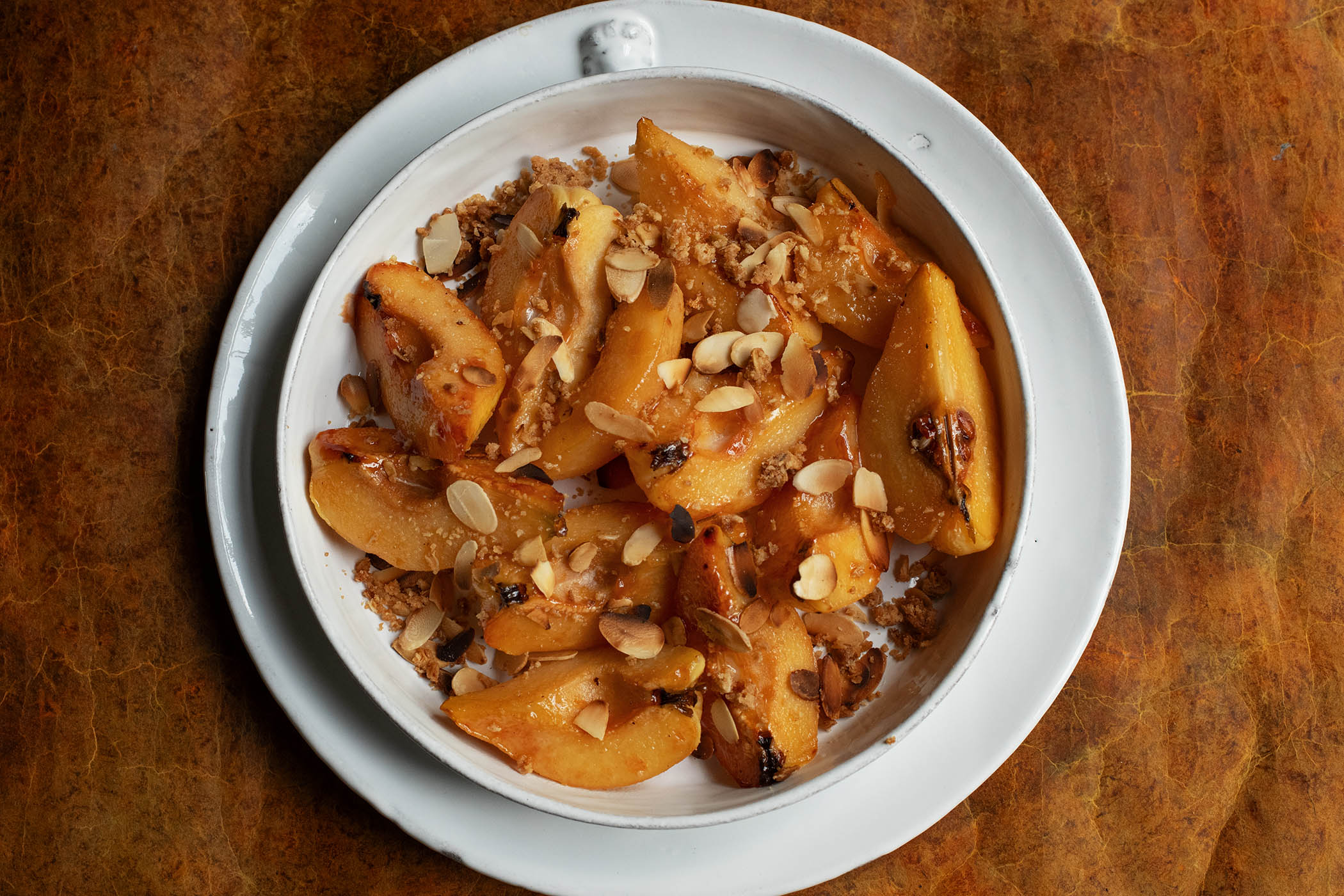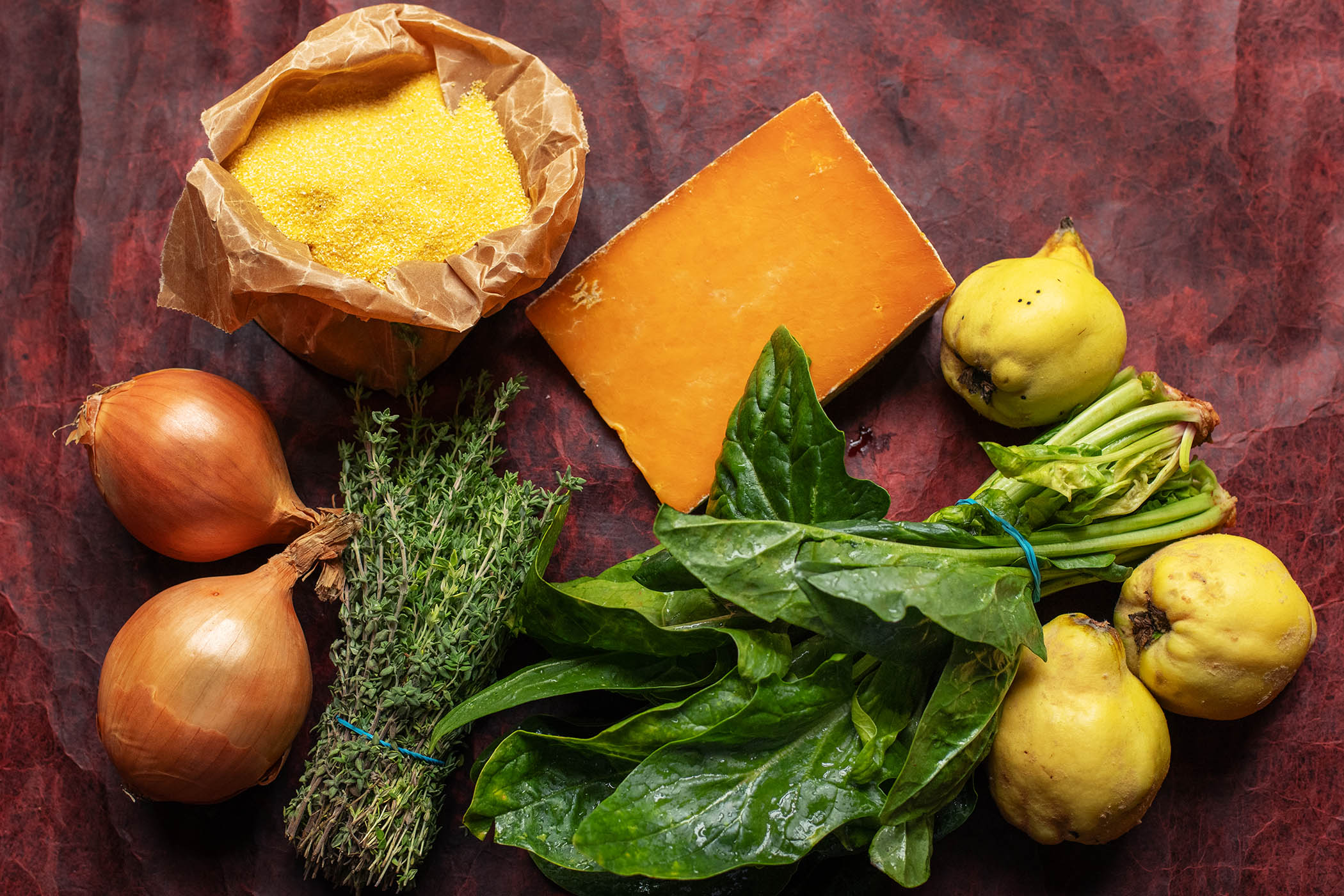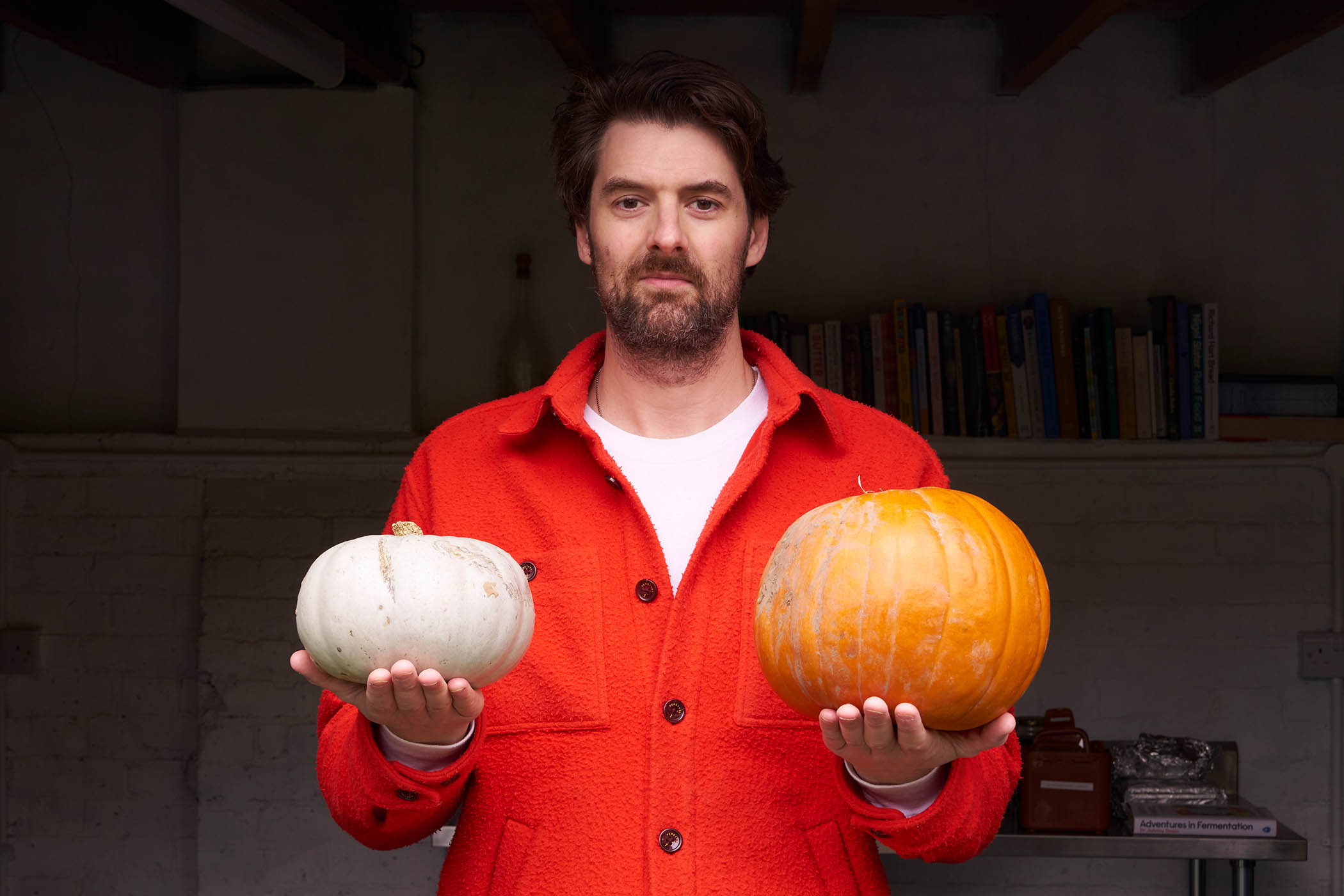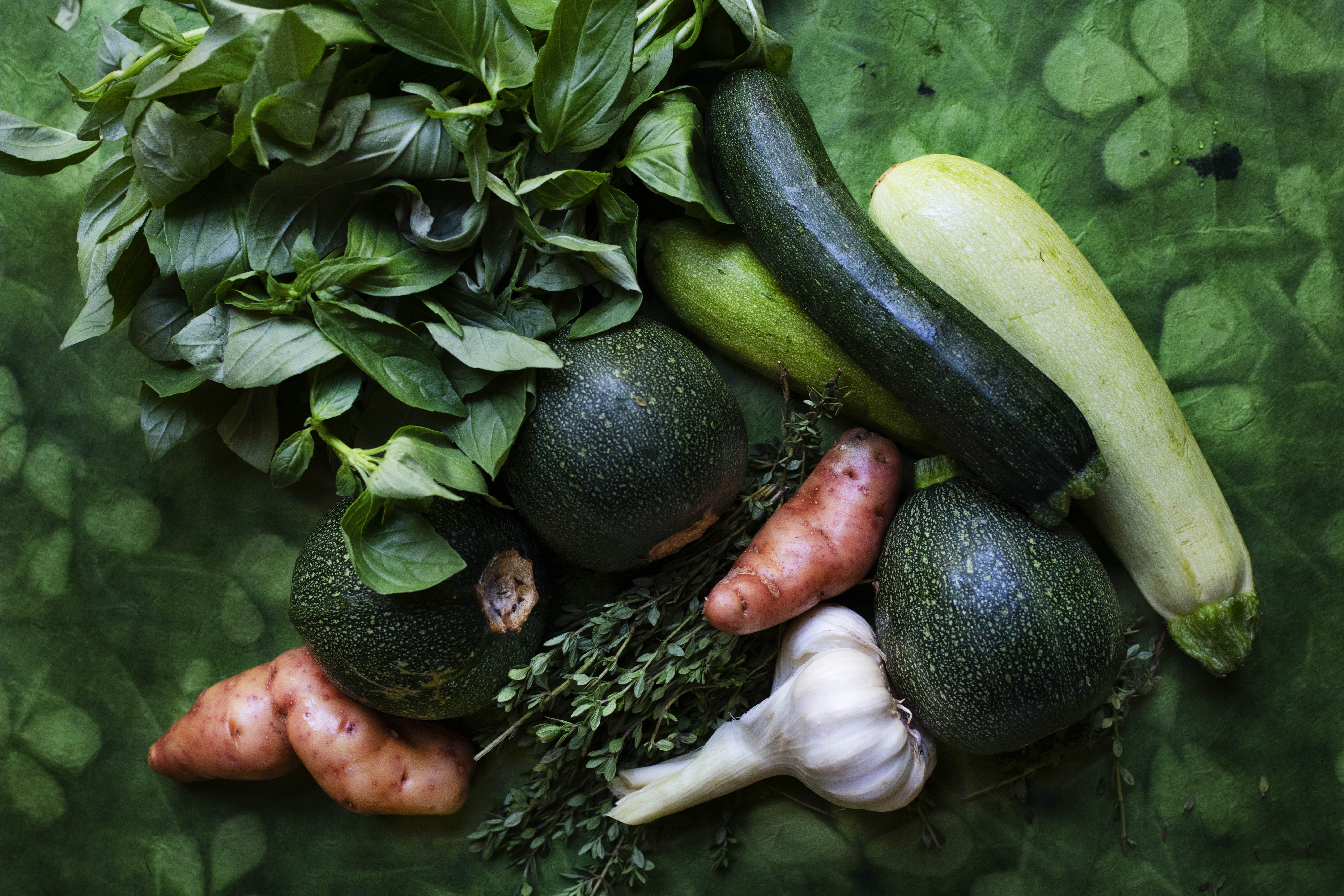
Photographs by Jonathan Lovekin
My cooking has begun to slow down as it often does in the summer. The familiar crackle and fizz of supper being prepared has given way to a more leisurely style. Green vegetables simmering gently on the hob with olive oil and herbs. The gentle blip of waxy-fleshed new potatoes sleepwalking their way to tenderness in an earthenware dish in the oven.
Such cooking, done over a low heat or in stock in the oven, is generally good-natured. Five minutes here or there isn’t going to end in tears. Food that needs only the occasional stir as it cooks. Nothing needs to be eaten immediately, although you may want to, as your supper has been sending puffs of garlic-scented steam throughout the house for the last hour. This week’s eating has been almost exclusively vegetable-based, including a dish of potatoes, lemon thyme and stock, left in a slow oven, cooking to the point where you crush them with just a little pressure from the back of a spoon.
The summer’s waxy potatoes take well to a long, slow bake. I slice them and braise them with chicken or vegetable broth and citrus-scented herbs, such as lemon thyme or a stick or two of lemon grass (removed once it has done its work). You can cook them from raw, but I prefer to fry the potatoes a little, to get a golden crust, then transfer them to the oven to bask in hot chicken and herb stock.
There are a lot of courgettes about. Pale green ones, others bottle-green or striped, and those occasional yellow ones, always slightly flaccid. I also came home with tennis ball-sized round courgettes this week, freckled like a bird’s egg. All will cook slowly in a covered pan, producing much juice, which you can scent with lemon and basil or perhaps tarragon. They can be grated or thinly sliced and cooked until almost jammy.
Related articles:
Courgettes cooked slowly produce much juice, which you can scent with lemon and basil
Most of this week’s salads have involved tiny leaves, from red-veined sorrel to the throwback charm of mustard and cress. There’s plenty of watercress around, too, which means soup and peppery leaves for crab sandwiches.
• You can cook green beans slowly, shredded into matchstick-thick slices, and cooked as the courgettes are above.
• An hour on the oven is the perfect place for a braise of soft vegetables such as aubergines, tomatoes and courgettes.
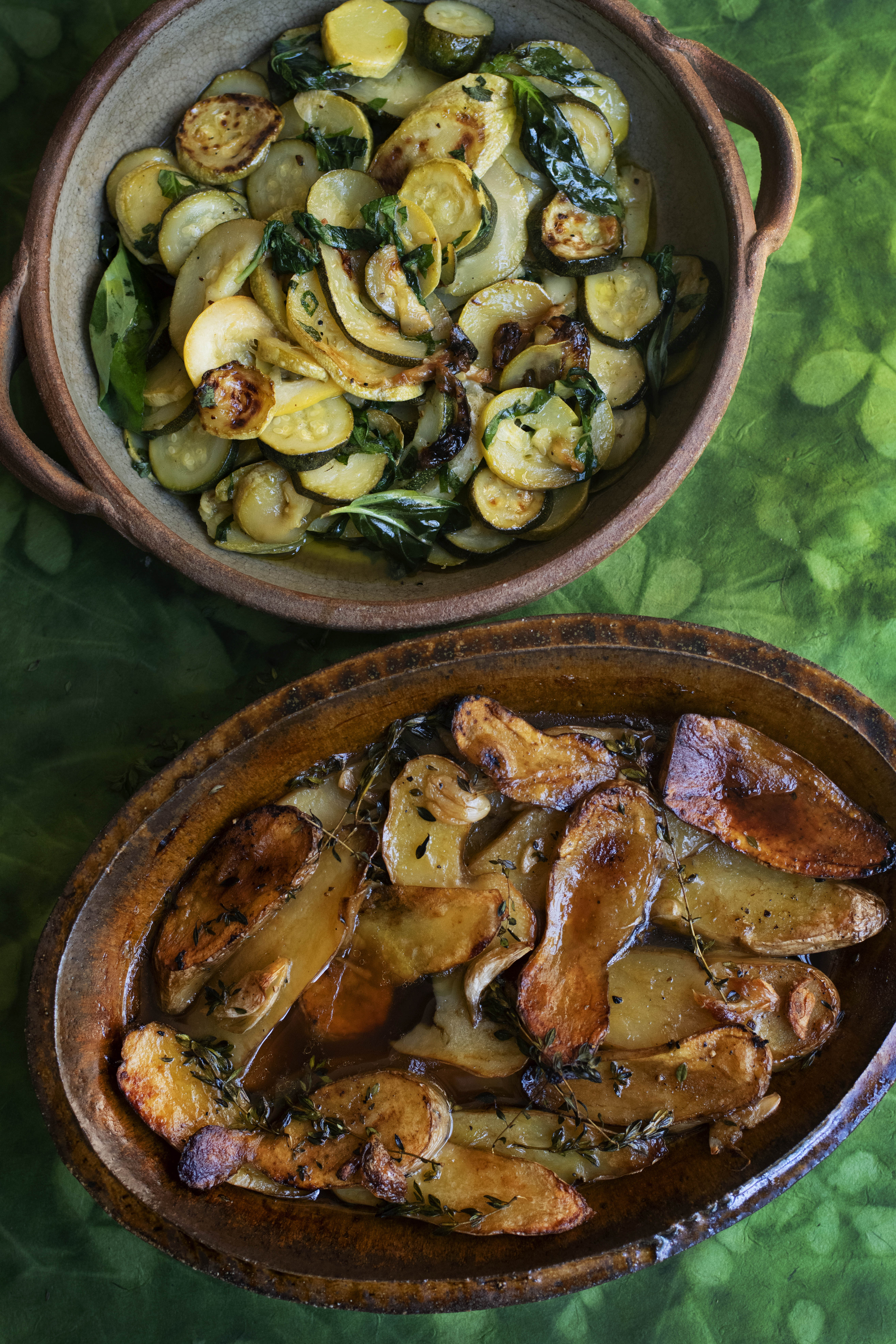
Soft and slow: (from top) courgettes cooked with garlic, lemon and basil; and baked new potatoes served in stock with lemon thyme
Slow-cooked courgettes and basil
Serves 4 as a side dish. Ready in 1 hour.
Basil’s charm does not survive long cooking. Introduce it towards the end, so the leaves gently warm rather than cook, to imbue the dish with something of the herb’s peppery, Mediterranean soul.
I use courgettes of differing sizes and colours for this recipe. The yellow variety has a softer flesh and will probably collapse more quickly, producing much sweet juice. Round courgettes have larger seeds, but they soften as they cook. In all cases you can leave the skin on.
I have been eating this as a side dish for grilled fish, or with steamed brown rice as a main course. There is something deeply pleasing about brown rice soaked in lemon juices and basil.
courgettes 750g
olive oil 3 tbsp
garlic 3 cloves
lemon 1
butter 30g
basil leaves 10g
Wipe the courgettes and trim the stalks. Slice each courgette into coins roughly 1cm thick. Pour the olive oil into a mixing bowl and add the courgettes. Peel and finely slice the garlic and add to the courgettes with a generous seasoning of salt and coarsely ground black pepper.
Cut half the lemon into 4 thick slices and toss them with the courgettes. Reserve the remaining half. Melt the butter in a wide, shallow pan over a moderate heat, then add the courgettes, garlic, olive oil and lemon slices. Lower the heat and cover with a lid.
Cook the courgettes slowly, for about 40 minutes, turning them over from time to time. They will partially fry and partially steam. Test them for tenderness. They should be at the point of collapse.
Squeeze the remaining lemon into a bowl. Tear or shred the basil leaves then add the lemon juice and basil to the courgettes, mixing gently. Eat warm.
Baked new potatoes with lemon thyme
Serves 4 as a side dish. Ready in 1 hour.
You could use any potato, but I like this dish made with waxy, yellow-fleshed potatoes such as Charlotte or the long, bumpy fingerling Pink Fir Apple. You will end up with plenty of lemon thyme-scented broth. A good side dish for roast or grilled chicken. If lemon thyme escapes you, then use the standard variety and a squeeze of lemon, perhaps a teaspoon of the zest, finely grated. The garlic is non-negotiable, as is some decent stock, chicken or vegetable.
new or waxy potatoes 500g
olive oil 2 tbsp
garlic 2 large cloves
lemon thyme leaves 1 tbsp, plus a few sprigs
stock 500ml, chicken or vegetable
Thinly slice the potatoes, no need to peel them. Warm the oil in a shallow pan over a moderate heat, then add as many potatoes as you can in a single layer and cook for 8-10 minutes until they start to colour. Lift them out and continue with the remaining potatoes. Heat the oven to 200C/gas mark 6.
Peel and thinly slice the garlic. Chop the thyme leaves. When they are pale gold in colour, put the potatoes into a large, shallow, ovenproof dish, layering them with the sliced garlic, salt and pepper and the chopped thyme leaves. Tuck the whole thyme sprigs among the potatoes.
Bring the stock to the boil, then pour into the dish. Bake for 35-40 minutes or until the potato slices are soft to the point of a skewer and golden brown on top.
Editor’s note: our recommendations are chosen independently by our journalists. The Observer may earn a small commission if a reader clicks a link and purchases a recommended product. This revenue helps support Observer journalism.


